Recently we reviewed the Intel Xeon E3-1220 V3. It was our second Haswell review and first with the new Intel Xeon E3-1200 V3 series parts. The Intel Xeon E3-1220 V3 represents a low cost solution but Intel limits the chip to 4C/ 4T since it does not have hyper threading. The Intel Xeon E3-1270 V3 is generally one of the more expensive mainstream performance 4C/ 8T parts, but is significantly faster in many heavily threaded workloads due to Hyper-Threading and a higher base clock speed. Since the 22nm part ends in a “0” this does not have an onboard GPU. Today we are benchmarking the Intel Xeon E3-1270 V3 with both our Windows and Linux benchmark suites. We are transitioning to the Linux test suite but did not have time to update results for the full Sandy Bridge and Ivy Bridge generations.
Test Configuration
For this test configuration, we attempted to utilize a test configuration similar to what we used in the Xeon E3 V1 and V2 test beds.
- CPU: Intel Xeon E3-1270 V3
- Motherboard: Supermicro X10SLL-F
- Memory: 16GB Kingston ECC 1600 CL11 DDR3 2x 8GB UDIMMs
- OS Drive: OCZ Vertex 4 256GB
- Enclosure: Norco RPC-4224
- Power Supply: Corsair AX750 750w 80Plus Gold PSU and PicoPSU 150XT with 150w power brick for power consumption testing.
- OS: Windows 7 Professional SP1 64-bit, Ubuntu 12.04 LTS
Nothing too exciting here. We will have more motherboard reviews in the near future.
Intel Xeon E3-1270 V3 Benchmarks
For this review, we are using the full Windows and Linux test suites. This is to maintain a point of reference during the benchmark transition.
Cinebench R11.5
We have been using Cinebench benchmarks for years. Cinebench has been added to the test suite because it does represent a valuable benchmark of multi-threaded performance. We have had quite a few readers contact me about this type of performance for rendering performance. Cinebench R11.5 is something that anyone can run on their Windows machines to get a relative idea of performance. After seeing Cinebench scale from one to 64 cores, it has become a favorite.

As we would expect, the Intel Xeon E3-1270 V3 performs very similarly as to the Intel Core i7-4770 we reviewed previously (and spoiler the stock clocked Intel Core i7-4770K). We also see a significant gain over the Intel Xeon E3-1220 V3 we reviewed recently. This is a well threaded test so there are significant gains thanks to Hyper-Threading.
7-Zip Compression Benchmark (Windows)
7-Zip is an immensely popular compression application with an easy to use benchmark. It is also part of our Linux benchmark suite.

In 7-Zip we are seeing slightly better performance than the Intel Xeon E3-1270 V2 and certainly more than the Intel Xeon E3-1270 V1. This result was less than expected, but still a solid result.
TrueCrypt Encryption Benchmarks
With Intel’s focus on its AES-NI features TrueCrypt can look a bit skewed. Unlike some dubious drivers over the years that were optimized for benchmarks over real world application, Intel’s AES-NI feature does encompass the addition of specialized hardware. This specialized hardware has many practical uses. For example, users of Solaris 11 can utilize the AES-NI features to see much higher throughput on encrypted volumes. AMD has started offering AES acceleration on many of its so it is a good test for most CPUs now. At the same time, modern processors are so fast that AES encryption is more or less “free” at any practical wire speeds.

Here we see the Intel Xeon E3-1270 V3 push just above the previous generation Intel Xeon E3-1290 V2 in terms of performance. That is a great result. At the end of the day, AES-NI is possible even at multiple 10GbE speeds with any of the processors that have hardware acceleration.
Hardinfo Performance
hardinfo is a well known Linux benchmark that has been around for years. It tests a number of CPU performance aspects.
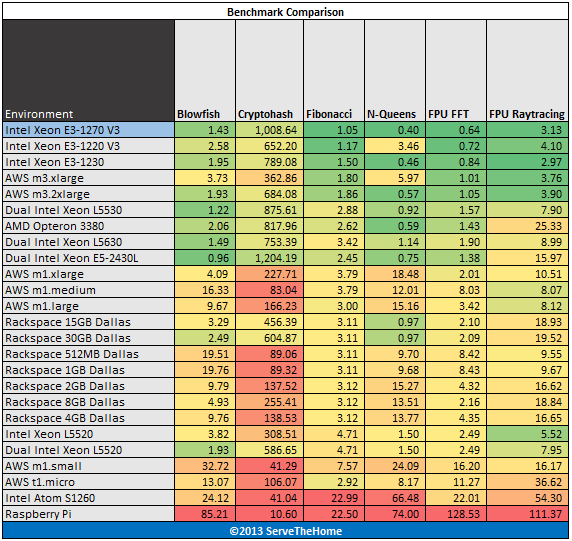
High clock speeds, and improved IPC over previous generations mean that the Haswell based Intel Xeon E3-1270 V3 is quite fast. It posts some of the best figures published thus far with our Linux test suite.
UnixBench 5.1.3 Performance
UnixBench may be a defacto standard for Linux benchmarking these days. There are two main versions, one that tests single CPU performance on that tests multiple CPU performance. UnixBench segments these results. We run both sets of CPU tests. Here are the single threaded results:

Again, for some reason the Intel Xeon E3-1230 system performed very well on a number of these tests. However, the Intel Xeon E3-1270 V3 is providing some solid numbers across and in-line with what we expect.
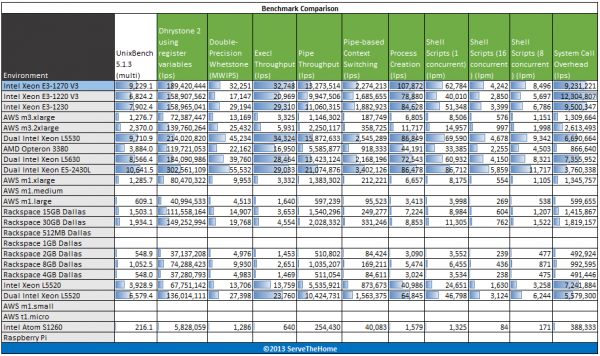
Moving to multi-threaded performance, we see the Intel Xeon E3-1270 V3 take up a leadership position on many tests, sometimes equaling dual Intel Xeon L5530 processors.
c-ray 1.1 Performance
c-ray is a very interesting ray tracing benchmark. It provides both consistent results and some clear separation. Ray tracing is generally a great multithreaded CPU benchmark. For this test we use both a simple 7500×3500 render and a more complex 1920×1200 render. Here are the results:
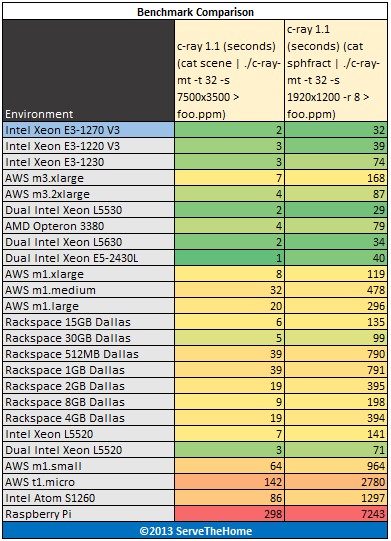
Here we see one of the better results on the c-ray benchmark. It shows a solid gain over the Intel Xeon E3-1220 V3 and at the same time again looks more like a low power 2P Xeon E5500 series system. A solid result for a system with such low idle power consumption.
Crafty Chess Performance
Crafty is a well known chess benchmark. It is also one where we saw issues last time with the Phoronix Test Suite and running on ARM CPUs. Here are the Crafty Chess results from simply running “crafty bench”:

Clock speed and IPC improvements with the Intel Xeon E3-1270 V3 really shine here. We can see a nice performance boost over previous generation parts.
Phoronix Test Suite Performance
We are using four tests from the Phoronix Test Suite: pts/stream, pts/compress-7zip, pts/openssl and pts/pybench.
- STREAM by John D. McCalpin, Ph.D. is a very well known memory benchmark benchmark. S
- 7-zip compression benchmarks were a mainstay in our Windows suite so we are including it again on the Linux side as a compression benchmark.
- The pts/openssl benchmark is very dependent on the CPU architecture being used
- Python is a widely used scripting language and pyBench is a nice single-threaded Python benchmark.
Here are the results of the Phoronix Test Suite benchmarks:
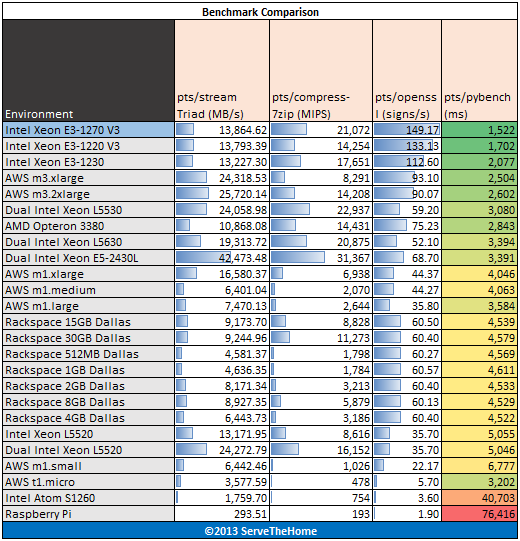
Again, the Intel Xeon E3-1270 V3 is performing similar to what we would expect here. One very interesting point is that the Intel Xeon E3-1270 V3 is blowing away the cloud instances we benchmarked in almost every test.
Power Consumption
Power consumption is a top concern for hardware manufacturers. We test using an Extech 380803 True RMS power analyzer. It is a really nice unit that even records usage over time.
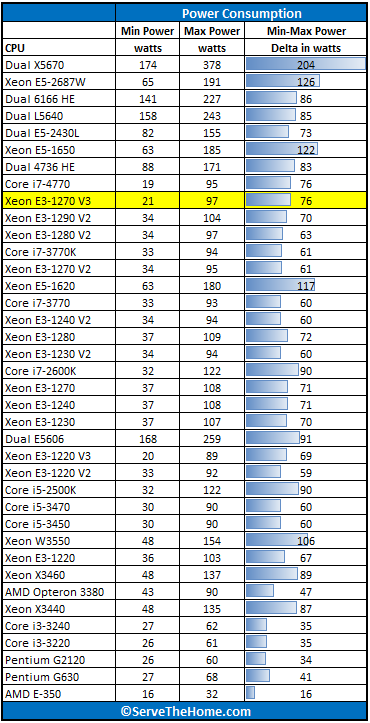
Slightly higher power consumption, but we see the delta between min and max power consumption right in line with the Core i7-4770. Of course, samples do exhibit slightly different power consumption within the same Intel model. The results are what we expected though.
Conclusion
The Intel Xeon E3-1270 V3 is an incremental upgrade over the Ivy Bridge generation. For those with applications where a machine will be idle often, the new Haswell Xeon architecture makes sense. For the web hosting industry, Haswell Xeon processors are going to be the new standard. The performance and power improvements are noticeable, so this is going to be the processor to get going forward. For older Sandy Bridge and Ivy Bridge generations, using Haswell as an upgrade path can be expensive since it requires a new motherboard. The jump between the Intel Xeon E3-1270 V3 and E3-1280 V3 is one from approximately $320 to $615 for a retail tray part. That makes the Intel Xeon E3-1270 V3 probably the sweet spot for getting the best performance/ dollar in a datacenter environment once all power and cooling are accounted for.

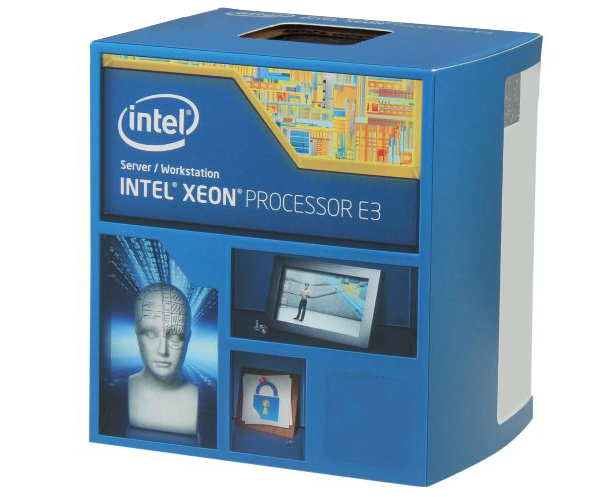
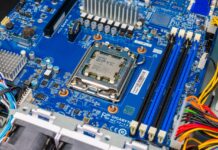
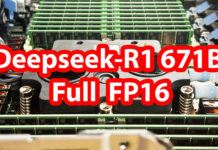
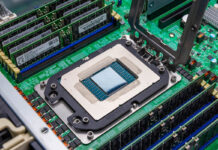
Great stuff! Can’t wait to see others. This gives a good idea of relative performance though. Thx STH team.
How come you did not compare it to the 1270 V2 or any V2 cpu in any important benchmark – Hardinfo, UnixBench, c-ray 1 or even Crafty Chess and phoronix?